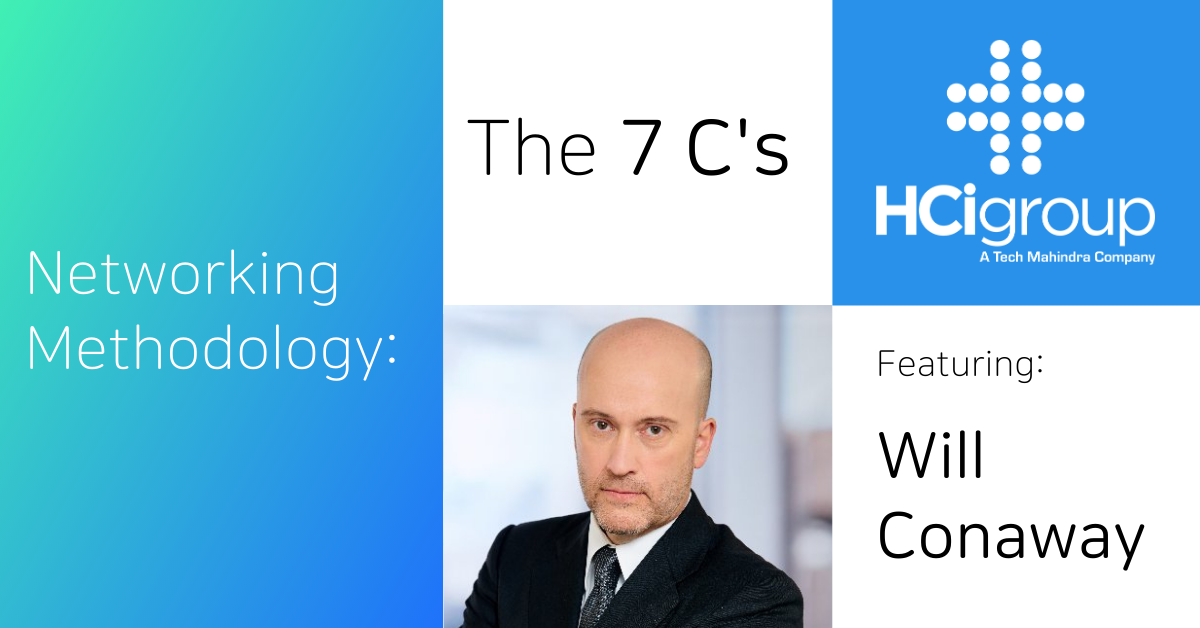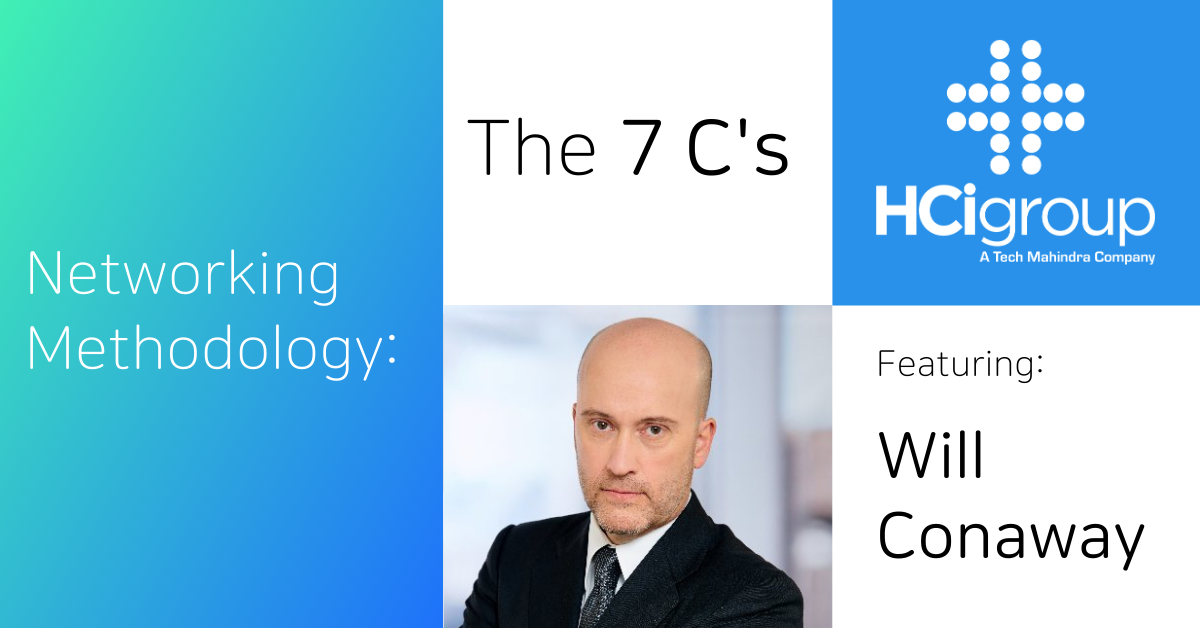Networking Methodology: The 7 C’s


Will Conaway, Vice President of Provider Delivery at The HCI Group, has written many articles and given teachings at Cornell University on the subject of psychology in technology and in a recent video he explored his networking methodology: the 7 C’s. These 7 C’s are the types of people that you need to have in your network in order to have a strong and successful career:
1. Confidants
View these people as your friends, but more importantly – the friends that you have in your life that have your best interests in mind. These people often have great insights about you and have known you for a long period of time. They can provide advice that is helps you and pushes your agenda but is also reasonable and feasible.
One negative is that we often confuse all of our friends as confidants and that is just not always the truth. We often have confidants in our lives who speak poorly about us, would like us not to do well and sabotage us at every opportunity. Why? It is not about you, but about them. You doing well in your life and career makes them feel bad about themselves. These are the type of people you need to separate yourself from.
2. Champions
These are your promoters. These are the people in your life who say good things about you both privately and publicly, who will often post nice comments on your social media. These are good people to have around and it is hard to find these people. They have learned a valuable lesson in life, and that is that helping others can often help themselves.
The negative of these people are that sometimes you cannot choose the people who promote you. Do all you can to associate yourself with people of great quality and good character. We all like to have nice things said about us but be careful who says it about you.
3. Collaborators
These are the people who will join in with your ideas and with your agenda and help push things in the right direction. With very few exceptions can anyone complete all items of a project, concept or idea along. You will always need collaborators.
The negatives:
- If you are a person who is a credit hound who wants all the credit to yourself, you may not want these types of persons around you. You need to be able to celebrate with your team and work together with people. Ultimately you and your team are the same.
- Often people who want to collaborate on projects are people who want to move up the ladder. Make sure those working with you really do understand and can perform the task at hand. Keep in mind we are most often judged by end results on not the intent we had.
4. Call On's
These are the people in your network that you can call on to have specific knowledge and expertise that you do not have. You cannot be expected nor should you assume that you can have knowledge on every topic, especially when we start talking about the fields of health life-sciences, technology, or product design. Things change fast and you need people around you who kept up on these specific areas.
The negative: Often we don’t have a strong network and we too many like people in our network. You need a diverse group of people and skillsets. You must make certain that you continue to work on the specialty people in your network, as they are vital when you don’t have the answer.
5. Connectors
It could easily be argued that your connectors are your most important network category members. These are the people who have and can offer contact with valued resources and people. These people have the ability to connect you with people who are game changers to your projects or career. Expanding your network of connectors is vital.
The negative: Too frequently we believe that we just need a volume of connectors and that is not the case. You need some diversity of connectors. Having people all in one field, group or industry might limit the amount of connectors you have. Don’t confuse volume of people in your network as having a lot of connections also. Ask yourself – How many people in your network have the ability to connect you with somebody else? And more importantly, how many people would? Having connections is only important if you can get access to them.
6. Coaches
Coaches provide deep insights and provide improvement techniques that help you complete your projects and tasks, and even drive forward goals. These are the people who can help you meet your expectations, by sharpening your skillsets and getting you to proficient levels. They will help you attain and get the levels you would not have achieved on your own. They often have deep knowledge and understanding of how to break bad habits, processes and procedures.
The negative is way too many people are embarrassed to think that they need a coach. This is especially true in the business world. You will often see managers and directors who believe that everyone assumes they already know everything and as such they don’t want to ask for help. Worse yet, often they actually believe they know everything just because of their title. These can lead to serious errors in judgement and massive damage to an organization.
7. Counselors
Do not confuse your counselor for a coach, as they are different. The counselor will focus on the relationship parts and help you learn to take responsibility for your growth, development and career. A good counselor should be able to have massive amounts of enthusiasm and will have relevant and expert experience that you can learn from. They will often have great active listening skills, which means that they will focus on you and only you. They will be able to provide honest and direct feedback, yet do it in a way that is empathetic. This person has been at a level that you would like to get to.
The negative: Not all counselors are great and equal. We often pick or are assigned to the wrong counsellors. Many people assume that their boss should be their counselor, but too often this just becomes an opportunity for your boss to unload enormous amounts of work upon you. Worse yet, if things aren’t working well, how do you end that relationship without ending your career? Choose your counselor wisely!
Will Conaway is the Vice President of Provider Delivery for The HCI Group, and an award-winning CIO and Technology Executive. He has extensive experience as an executive leader in healthcare, organizational strategy, organizational operations, negotiations, mergers & acquisitions, leadership, international business, information technology and transformation, consulting, and delivery. Will is recognized for his continuing contributions to strategic planning and innovation in healthcare, and is a highly sought-after subject matter expert, speaking at universities and technology councils across the country. He was the keynote speaker at the Cornell University’s August 2019 ILR School’s EMHRM Graduation, and he was the featured speaker at Kansas State University in October of 2019.
He served on the Board of Governors at the Federation of American Hospitals, Manifest MedEx Advisory Committee (HIE), AT&T’s Healthcare Advisory Council, Verizon’s Healthcare, Insurance and Life Sciences Customer Advisory Board, and a member of the American Heart Association 2020 ELT. He is the Chair of Kansas State University Psychology Sciences Alumni Advisory Council, and a member of the Los Angeles World Affairs Council. Will is a recipient of Constellation’s Business Transformation 150 (BT150) award, Becker’s Hospital Review’s 100 Hospital and Health System CIOs to Know for 2019. He was a finalist for The Millennium Alliance’s 2019 Healthcare Innovator of the Year.
